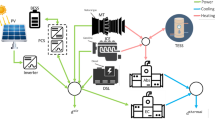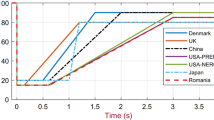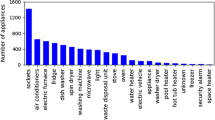Abstract
We investigated the real-time pricing demand response management system of multiple microgrids and multiple power users. Accordingly, we have proposed a Stackelberg-evolutionary joint game framework to examine the real-time pricing scheme of multiple microgrids and multiple power users so as to establish equilibrium strategies. Both a non-cooperative game among multiple microgrids and a multi-population evolutionary game among multiple power users were considered. Furthermore, we constructed a Stackelberg game between microgrids and power users to reflect their sequential interaction, wherein the microgrids are leaders, and the power users are followers. We also proved the existence and uniqueness of the Stackelberg equilibrium. Furthermore, we proposed an iterative algorithm to compute the equilibrium strategy and demonstrate the convergence and effectiveness through numerical simulations, which demonstrated that the algorithm could achieve a balance between power supply and demand balance.
Similar content being viewed by others
References
Lu T G, Chen X Y, McElroy M B, et al. A reinforcement learning-based decision system for electricity pricing plan selection by smart grid end users. IEEE Trans Smart Grid, 2021, 12: 2176–2187
Ghosal A, Conti M. Key management systems for smart grid advanced metering infrastructure: a survey. IEEE Commun Surv Tutorials, 2019, 21: 2831–2848
Yang J J, Zhao J H, Luo F J, et al. Decision-making for electricity retailers: a brief survey. IEEE Trans Smart Grid, 2018, 9: 4140–4153
Wan Y N, Qin J H, Yu X H, et al. Price-based residential demand response management in smart grids: a reinforcement learning-based approach. IEEE CAA J Autom Sin, 2022, 9: 123–134
Cheng L F, Yu T. Game-theoretic approaches applied to transactions in the open and ever-growing electricity markets from the perspective of power demand response: an overview. IEEE Access, 2019, 7: 25727–25762
Ding T, Qu M, Amjady N, et al. Tracking equilibrium point under real-time price-based residential demand response. IEEE Trans Smart Grid, 2021, 12: 2736–2740
Cao G C, Fang D B, Wang P Y. The impacts of social learning on a real-time pricing scheme in the electricity market. Appl Energy, 2021, 291: 116874
Aljohani T M, Ebrahim A F, Mohammed O A. Dynamic real-time pricing mechanism for electric vehicles charging considering optimal microgrids energy management system. IEEE Trans Ind Applicat, 2021, 57: 5372–5381
Yang H L, Schell K R. Real-time electricity price forecasting of wind farms with deep neural network transfer learning and hybrid datasets. Appl Energy, 2021, 299: 117242
Estebsari A, Mazzarino P R, Bottaccioli L, et al. IoT-enabled real-time management of smart grids with demand response aggregators. IEEE Trans Ind Appl, 2022, 58: 102–112
Seok H, Kim S P. Pareto efficient incentive-based real-time pricing model for balanced smart grids. IEEE Access, 2022, 10: 2766–2774
Jiang Y N, Zhou K L, Lu X H, et al. Electricity trading pricing among prosumers with game theory-based model in energy blockchain environment. Appl Energy, 2020, 271: 115239
Tang R, Wang S W, Li H X. Game theory based interactive demand side management responding to dynamic pricing in price-based demand response of smart grids. Appl Energy, 2019, 250: 118–130
Hayes B, Melatti I, Mancini T, et al. Residential demand management using individualized demand aware price policies. IEEE Trans Smart Grid, 2017, 8: 1284–1294
Mishra M K, Parida S K. A game theoretic approach for demand-side management using real-time variable peak pricing considering distributed energy resources. IEEE Syst J, 2022, 16: 144–154
Lee D, Kundur D. An evolutionary game approach to predict demand response from real-time pricing. In: Proceedings of IEEE Electrical Power and Energy Conference, Ontario, 2015. 197–202
Liu F, Pan L, Yao L. Evolutionary game based analysis for user privacy protection behaviors in social networks. In: Proceedings of IEEE 3rd International Conference on Data Science in Cyberspace, Guangzhou, 2018. 274–279
Hu M, Xiao J W, Cui S C, et al. Distributed real-time demand response for energy management scheduling in smart grid. Int J Electrical Power Energy Syst, 2018, 99: 233–245
Liu W, Gu W, Wang J, et al. Game theoretic non-cooperative distributed coordination control for multi-microgrids. IEEE Trans Smart Grid, 2018, 9: 6986–6997
Yu M M, Hong S H. A real-time demand-response algorithm for smart grids: a Stackelberg game approach. IEEE Trans Smart Grid, 2016, 7: 879–888
Kamyab F, Amini M, Sheykhha S, et al. Demand response program in smart grid using supply function bidding mechanism. IEEE Trans Smart Grid, 2016, 7: 1277–1284
Chai B, Chen J, Yang Z, et al. Demand response management with multiple utility companies: a two-level game approach. IEEE Trans Smart Grid, 2014, 5: 722–731
Li J, Ma G Q, Li T, et al. A Stackelberg game approach for demand response management of multi-microgrids with overlapping sales areas. Sci China Inf Sci, 2019, 62: 212203
Yao R T, Lu X Q, Zhou H, et al. A novel category-specific pricing strategy for demand response in microgrids. IEEE Trans Sustain Energy, 2022, 13: 182–195
Aguiar N, Dubey A, Gupta V. Network-constrained Stackelberg game for pricing demand flexibility in power distribution systems. IEEE Trans Smart Grid, 2021, 12: 4049–4058
Gao B T, Chen C, Qin Y H, et al. Evolutionary game-theoretic analysis for residential users considering integrated demand response. J Modern Power Syst Clean Energy, 2021, 9: 1500–1509
Xue K P, Yang Q Y, Li S H, et al. PPSO: a privacy-preserving service outsourcing scheme for real-time pricing demand response in smart grid. IEEE Internet Things J, 2019, 6: 2486–2496
Samadi P, Mohsenian-Rad A H, Schober R, et al. Optimal real-time pricing algorithm based on utility maximization for smart grid. In: Proceedings of the 1st IEEE International Conference on Smart Grid Communications, Gaithersburg, 2010. 415–420
Mohsenian-Rad A H, Wong V W S, Jatskevich J, et al. Autonomous demand-side management based on game-theoretic energy consumption scheduling for the future smart grid. IEEE Trans Smart Grid, 2010, 1: 320–331
Wood A J, Wollenberg B F. Power Generation Operation and Control. New York: Wiley-Interscience, 1996
Cheng L F, Yu T. Nash equilibrium-based asymptotic stability analysis of multi-group asymmetric evolutionary games in typical scenario of electricity market. IEEE Access, 2018, 6: 32064–32086
Han O Z, Ding T, Bai L Q, et al. Evolutionary game based demand response bidding strategy for end-users using Q-learning and compound differential evolution. IEEE Trans Cloud Comput, 2022, 10: 97–110
Friedman D. On economic applications of evolutionary game theory. J Evolary Economics, 1998, 8: 15–43
Zhu Z Q, Chan K W, Bu S Q, et al. Analysis of evolutionary dynamics for bidding strategy driven by multi-agent reinforcement learning. IEEE Trans Power Syst, 2021, 36: 5975–5978
Lakshmikantham V, Leela S, Martynyuk A A. Stability Analysis of Nonlinear Systems. 2nd ed. Switzerland: Springer International Publishing Switzerland, 2015
Slotine J E, Li W P. Applied Nonlinear Control. Englewood Cliffs: Prentice Hall, 1991. 61–67
Ma K, Wang C S, Yang J, et al. Pricing mechanism with noncooperative game and revenue sharing contract in electricity market. IEEE Trans Cybern, 2019, 49: 97–106
Zhang W Y. Game Theory Information Economics. Shanghai: Shanghai People’s Publishing House, 2012
Yates R D. A framework for uplink power control in cellular radio systems. IEEE J Sel Areas Commun, 1995, 13: 1341–1347
Başar T, Olsder G J. Dynamic Noncooperative Game Theory. 2nd ed. New York: Academic Press, 1995
Author information
Authors and Affiliations
Corresponding author
Rights and permissions
About this article
Cite this article
Li, J., Li, T. & Dong, D. Demand response management of smart grid based on Stackelberg-evolutionary joint game. Sci. China Inf. Sci. 66, 182201 (2023). https://doi.org/10.1007/s11432-022-3674-6
Received:
Revised:
Accepted:
Published:
DOI: https://doi.org/10.1007/s11432-022-3674-6




